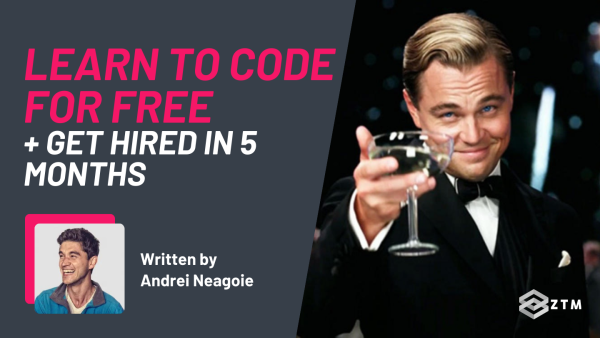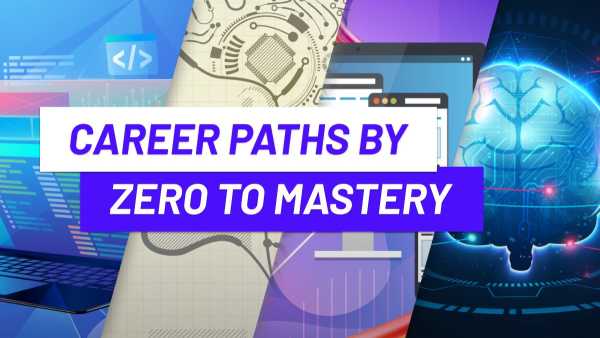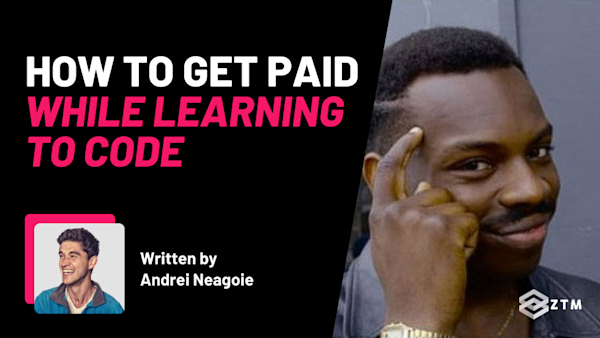Are you thinking of learning to code online, but not sure which platform to learn from?
I get it! With literally 100’s of sites and options, it can be overwhelming to know where to start or which to choose.
So, I figured I would make it easy for you.
We surveyed 1,000's of our ZTM students to find out the platforms they have used to learn to code. Then we took that list of platforms and narrowed them down to the top 14 best options - based on the most common goals that tech professionals are usually looking for:
How much does it cost?
How often content is updated?
Do they cover topics for the role I want to be hired in?
Do they have courses for beginners?
Do they have training for intermediate to advanced?
Do they have community support?
Etc
It's obviously not an exhaustive list of all the places out there or this post would never end, but it's a solid collection. In fact our goal with this guide was to limit the number so you can make your choice and start learning ASAP.
Once we had that list, I then broke down each platforms pros and cons and how they best fit these user needs. Read, choose, and then learn. Easy!
So let's get started.
Mile-high overview: Our Top 4 choices of the Best Online Coding Course Platforms
Spoiler alert! Here are our 4 winners, based on some of those criteria I mentioned:
⭐ Best free platform: FreeCodeCamp
⭐ Best very low cost option: Udemy (for now)
⭐ Best for upskilling: Frontend Masters
⭐ Best for beginners that want to get hired ASAP: Zero To Mastery
Click on any of those to jump to each section and see why we ranked them like this.
Or if you want to make the decision for yourself, keep reading and I'll break down the other 10 options and their pros and cons.
YouTube
With literally billions of videos watched every day, YouTube is the first place most of us go when we're trying to learn something new. No matter how big or small.
We all know and love the platform and we even share intros to our own courses on there so you get the first 8 hours or so for free:
We all love free stuff, but is free content good at teaching you to code?
Well, let’s break it down…
Pros
✔️ YouTube is free. Free is free, and there’s absolutely nothing wrong with starting with some free self-directed learning. In fact, it's probably a great idea to start with some free content and see if you're even truly interested in learning to code before investing in other training.
✔️ Tons of quality content. You can simply open your browser, search almost any language or framework that you want to learn, and find training tutorials on every subject imaginable.
There is some incredible coding content on YouTube, and it's super useful for learning very specific topics and some of the fundamentals (especially topics that don't go out of date)
Cons
❌ Overwhelming amount of choice! YouTube is HUGE which means it can be a little daunting to know which videos to watch and who to trust.
❌ Quality control There is some incredible content on YouTube but there's also a ton of terrible content as well, and it's hard to know which is which until after you've already watched it.
❌ Outdated Content. YouTube videos are usually ranked higher based on the number of views they have. Sometimes that's good and sometimes its bad. Why? Well, videos with lots of views keep getting recommended, even if they're totally outdated.
It's no secret that the tech industry moves fast, and many languages and frameworks are constantly being changed and updated.
Since videos can't be "updated" on YouTube (they have to be re-uploaded and re-start at 0 views), which leads to a lot of older and out-of-date information being the most popular.
One way to get around this is to check when the video was uploaded or even add that as a filter when searching. Some videos will also mention the version of the language / framework they are using, which you can Google to see if that version is still relevant or not before sitting down to watch.
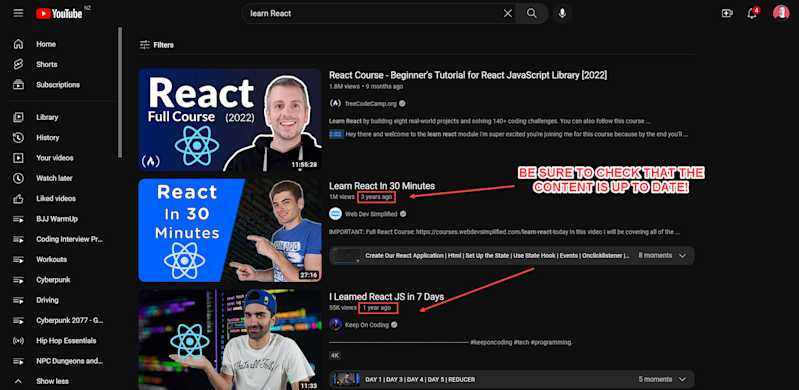
❌ There's no focus. The majority of videos will bounce around with no clear structure of how to learn, which can be frustrating. This isn’t true of every video, as there are some great training videos out there, but not everyone who knows a topic is good at organizing their thoughts.
❌ Mostly beginner content with no set path to success. This is totally fine when you're just getting started but it becomes very hard to know what to do next which leads to the infamous 'tutorial hell' experience.
❌ Lots of distractions. If you’re not running a pop-up blocker, then be prepared to watch an ad every 5 minutes or so.
On a 3-hour video this all adds up, and that’s assuming they’re not adding in mid-roll ads directly into the video. There are only so many times you can hear about NordVPN or HelloFresh before you go insane. (This is the cost of "free" 🙂).
Also, it can be very hard to learn when you have banner ads and recommended videos in the sidebar distracting you.
❌ No support. There’s no coding community or support, so you're on your own. You can get resources and support elsewhere but it's definitely not the same as a dedicated community or teacher assistance.
❌ No pain of inaction. The final issue with free is that you have no 'skin in the game'. What I mean by this, is when things are free, you're far less likely to value them and follow through. Even small costs can help make a huge difference in if you do the thing and learn.
TL;DR
YouTube is a great place to start getting your feet wet and seeing what it’s like to code, but it may not be the best experience unless you’re very disciplined.
It's hard to argue with free but it often lacks the structure and support of a dedicated learning environment.
With that in mind, let’s look at two other free resources that do have more structure.
The Odin Project
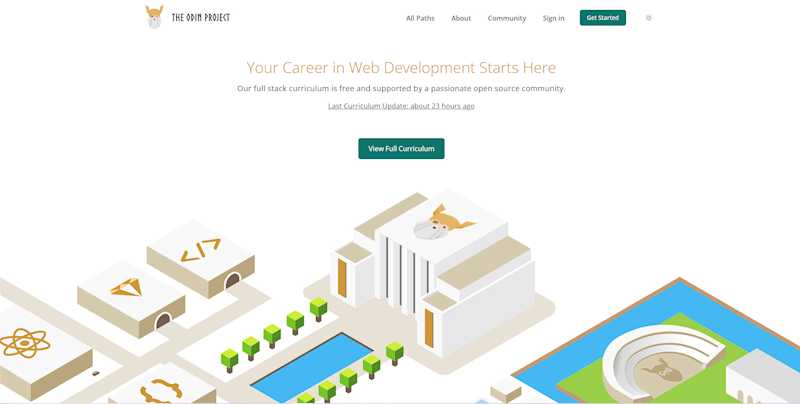
The Odin Project is an open-source (a.k.a. free) site, dedicated to teaching you how to become a Web Developer.
They have 3 major paths which contain a few connected course topics:
An introduction to Web Development, focusing on HTML, CSS and basic JavaScript
An intermediate to advanced JavaScript course, going into more detail on JavaScript, as well as Node.js, and intermediate to advanced HTML and CSS
And finally, a deep dive into Ruby on Rails which covers similar content as the JS course but tailored to Ruby, and training in Databases and how to get hired as a Web Dev
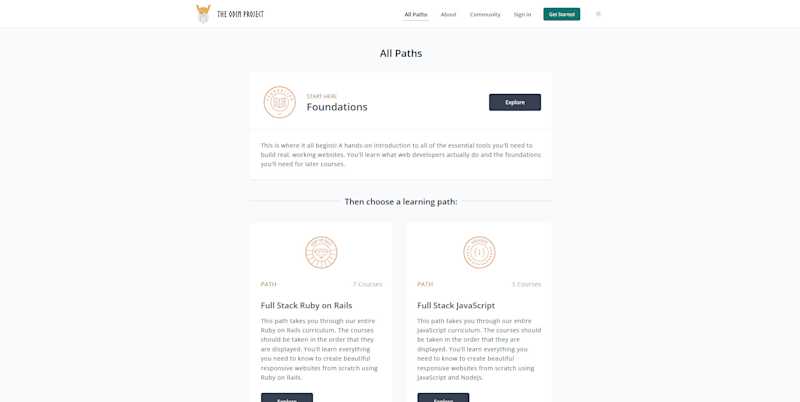
Not bad right?
So let’s look at the pros and cons.
Pros
✔️ It’s free! If you're a student or struggling for cash, then this is a price you'll love
✔️ They guide you from A to B. The Odin project has a course structure to go from beginner coder to practicing Web Developer. You don’t have to guess what to learn, or what order to learn it in
✔️ Support. They have an active and supportive community. In fact, the courses are actually created by the community members themselves
Cons
❌ It’s Web Dev focused. This is a great thing if you want to become a Web Developer, but not great if you want to learn other languages or different areas of programming
❌ Limited training content. There’s not a huge volume of courses, simply because of that Web Dev focus. Again, this is not even necessarily a con because if it’s your goal to work in this role, then you don’t need much else to get started
TL;DR
If you want to become a Web Dev, then the Odin Project is a very popular and great option.
FreeCodeCamp
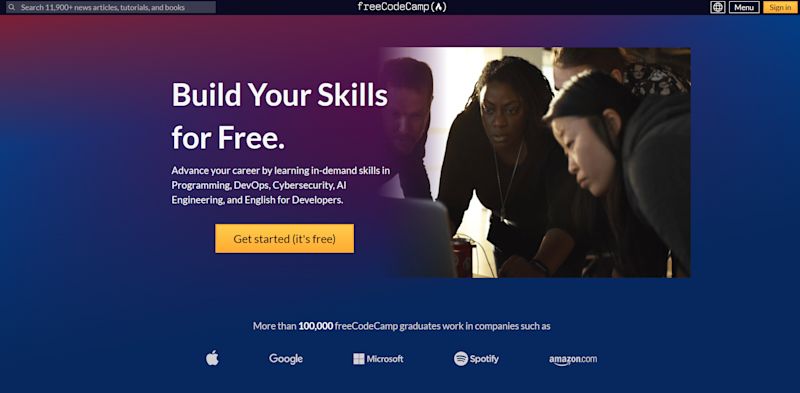
⭐ This is our choice for the best free learning option.
FreeCodeCamp is another open-source, non-profit project, with courses covering a HUGE range of topics.
They have an active community, great blog content and more! It sounds too good to be true right? So let’s weigh up the pros and cons.
Pros
✔️ It’s free. We've talked about the benefits of this a few times already. Starting with some free self-directed learning is a great way to see if you're truly interesting in learning to code before investing in training
✔️ Large training library. They have an array of courses covering Web Design, Data Structures and Algorithms, Full-stack development, Machine Learning, and more, as well as over 9,000 tutorials (varying between actual courses, blog posts and YouTube videos)
✔️ Support! They have an active and helpful community
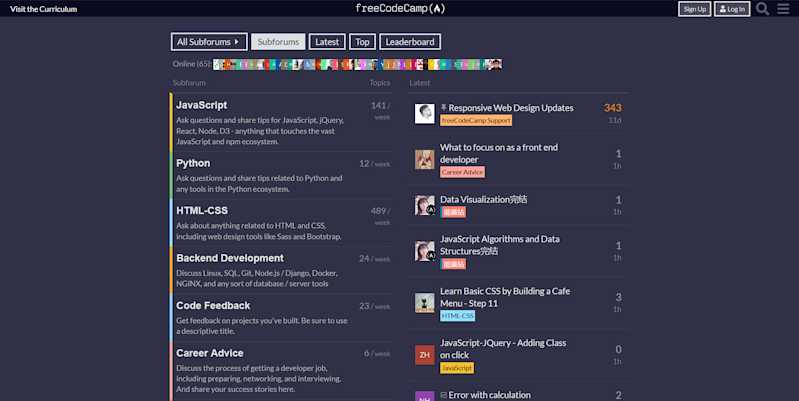
Cons
❌ Free isn’t always a good thing. If you’re already coding and need to skill up on a specific topic they teach, then FreeCodeCamp is a great place to skill up. It’s also fantastic for beginners, just as long as you can hold yourself accountable.
What do I mean?
Well, it sucks, but sometimes the only way we can stick to a goal is if there's some kind of external motivation. Often we’re motivated far more by a potential loss than we are by a gain. That's not always ideal, but it's just our psychology.
For example
Think of a gym membership vs free weights at home. You can either pay $37 a week for a gym membership, or a one-off cost of $20 for a kettlebell.
It seems like the kettlebell is the obvious choice, but the thing is, you may only feel motivated to use the kettlebell once or twice. But the fact that you’re paying for the gym each week motivates you to go every week until you’re fit and in shape.

However, if there's some kind of pain to motivate you to keep using the kettlebell, then you'll be consistent with it. Often though, we'll just stop using them over time and not reach our goals 😭
❌ Some content isn't complete. What I mean by this, is that because FreeCodeCamp has such a great mission, other course platforms will often share some of their courses on there for the FreeCodeCamp audience to take, but usually it's only part of a course.
For example
We actually share our own Pytorch for Deep Learning course on FreeCodeCamp, but it's only the first 20 hours. Whereas the full course is almost double that size at over 42 hours long and has more projects and further skills to cover.
Which means you would be missing out on the project work to help get you hired.
❌ The certifications are insanely HUGE. On the other end of the spectrum, FreeCodeCamp also offers 11 certifications. These are basically roadmaps of what to learn for specific topics.
However, each one takes around 300 hours each to complete! That's so much time, when you consider courses on other platforms can be done and certified in 40-100 hours.
This is a common issue in education, where you end up learning a lot of things you don't need to, and it can really slow down your progress.
TL;DR
FreeCodeCamp is a great place to learn to code, especially if your finances are limited, and you have the drive to get work done on your own.
There are some people out there who have the discipline and focus to succeed without that external loss motivator. For most of us though, if we don't have even a little ‘skin in the game’ to succeed, then we won't follow through on content or training (this isn't even a con specific to FreeCodeCamp).
I recommend you try this platform as an option and see how you do. Then if you struggle, start looking at some paid course platforms with an active community that will keep you engaged, and see if they help you stick to your goals.
Pssst... We went ahead and combined all the best free resources into one guide 🤯?!
Whaaaaat? This sounds too good to be true right?
Well before we start covering the best paid learning options, I have a resource to help you out if you're dead set on learning for free BUT are worried about not knowing what to learn and in what order.
So here's the deal:
Our head instructor Andrei taught himself how to code using entirely free resources.
And because he wanted to give back to the community, he documented his entire journey and created a 5-month step-by-step curriculum that you can follow to learn to code for free from scratch!
It only uses the best and most up-to-date free resources available online (including from each of the sites mentioned above) so that you don't waste your valuable time. He even updates it every year, so you know you can trust it.
Literally 1,000's of people have used this guide to learn to code and get hired for free, so definitely check it out.
Otherwise, let's look at the paid options and why they might be better than free.
Udemy
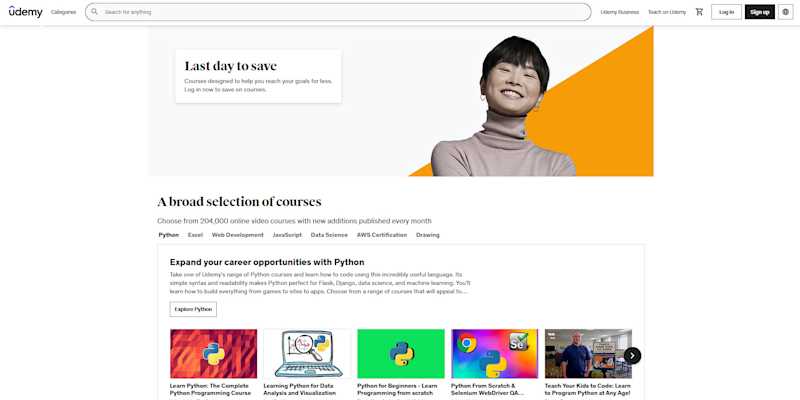
⭐ This is our top choice for ‘broad’, low-cost training platforms. At least for now anyway...
Udemy is an incredibly large training platform (250,000 courses listed at time of writing) with courses covering an endless array of topics from almost any industry.
No joke, but there are 364 courses around either raising or cooking chickens!
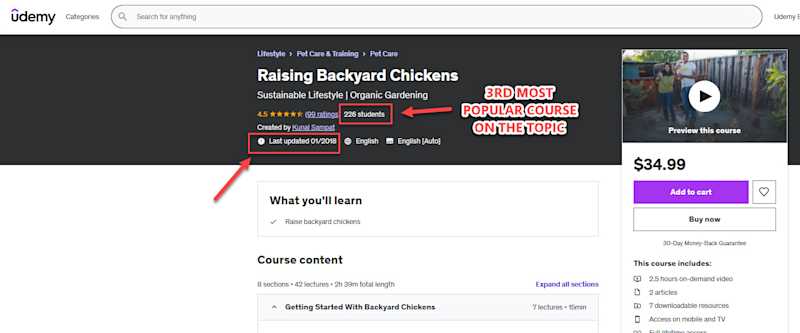
They also have a HUGE selection of coding courses for a one-off cost, some of which are introductions or offshoots of larger coding-specific platforms.
However, Udemy was recently purchased by Coursera and it's not clear how this will impact the course content. Will the courses still be available? Will the pricing change? Will instructors update content if earning less?
It's all up in the air at the moment, but let's cover what we do know:
Pros
✔️ Huge training library. Udemy has a ridiculously huge database of courses from experts (but also many non-experts... be careful out there) in multiple fields
✔️ Low cost. Accessible and affordable to pretty much anyone in the world but also enough of a cost to get you to at least start the course and get learning. Getting started is such a big deal in online learning
✔️ 30-days refund policy. You can try a bunch of courses out and if you aren't liking them, you can get a refund so it's pretty low risk
Cons
❌ Overwhelm. Just like with YouTube, the sheer volume of courses available here can be overwhelming. Especially because these can be all around the same topic.
For example
If you want to learn Python, then there are over 10,000 Python courses available, all on the same platform from various teachers.
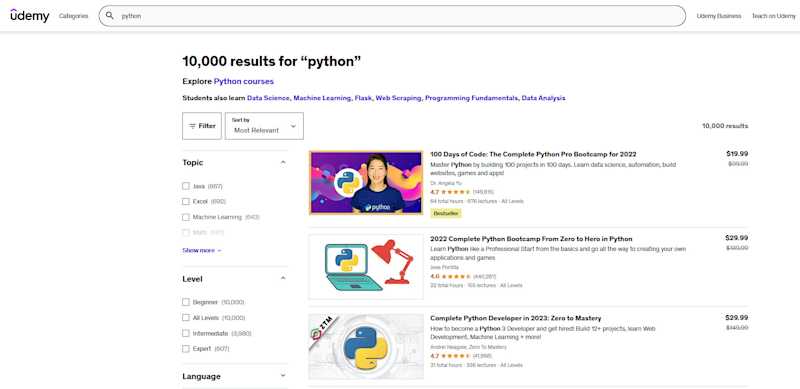
Who do you choose? How do you know who is an expert vs. a great marketer?
❌ Focused on growth vs student success. Udemy is becoming more and more focused on their 'Udemy For Business' product, where they sell their courses to businesses rather than consumers, because that's where the money is at. (It's possibly what helped them sell the company also).
This means less time and energy is being spent on improving the platform for individuals, and more focus on B2B. Unfortunately this does mean that some key elements to help you succeed are missing.
Like what you ask?
Well, there isn't a community of other students to learn and work together on projects with per se. Instead, some instructors have created their own communities like Andrei did with ZTM + Discord when we used to add our own courses on there. However, Udemy itself doesn't monitor these communities or measure how active and useful they are.
Also, while there is a Q&A section where students can ask questions, there is no guarantee you will receive a response. Some instructors are better at answering than others but it's hit and miss.
That said, there are other avenues you can ask questions like StackOverflow or other Slack / Discord coding communities, but it's unlikely people on these other platforms will be able to help with anything specifically related to the course you're taking.
❌ Can you trust the information? With so many course topics and versions, there is no one at Udemy that actually verifies that the course content is accurate or that it's high quality. Instead it's left up to a user review system, similar to what Airbnb uses. (And a lot of this can be gamed).
❌ May not be up to date. Often courses are published on Udemy and then left forever. That means the course content can often be out of date. We've mentioned this issue before but it's worth remembering that when it comes to coding and tech skills, they are constantly being updated and changing so you need to be confident that what you're learning is still relevant.
Also, you can't simply rely on the "last updated" date on a course either because an instructor can literally change one word in a course and it will auto-trigger that date to be updated. At least with YouTube, once a video is posted, it can't be altered and will always have the original date, but here, it's hard to know if the information is still relevant.
Add in the fact that Udemy has implemented a number of changes over the past few years that negatively affect course creators and their earnings, and it means it's possible that some instructors may no longer update their courses on there or answer student questions because it's just no longer worth their time.
A large number of ZTM students start out using YouTube and Udemy and get frustrated with their progress so then they come to us. That's exactly what happened with Shaun:
TL;DR
Even with these cons, Udemy is still a great place to find some high-quality training at a great price, as long as you’re willing to search through the results and try a bunch of courses out to see what the best fit is for you.
It lacks some elements that can help you succeed online, but again, with some self-discipline and organization, it can be a fantastic platform to start your coding journey. There are other competitors on the market such as Skillshare or Linkedin Learning that can be good options as well, but I know for a fact that there are some great teachers and courses on Udemy.
We know this from first-hand experience as we've had thousands (yes, you read that number right) of students go from zero coding knowledge or experience to getting hired as developers from taking some of the Zero To Mastery courses that we've posted on Udemy. (Although we no longer update courses on there, so be sure to check them out here if you want up to date content!)
For these reasons, Udemy is still our recommendation for low-cost, one-time course purchases but we'll see how things play out in the next couple years.
So what's next?
Well, what if you want more accountability, structure, updated content, and systems in place to help make sure you actually complete your training and reach your goals, let’s look at some other great platforms that have these factors…
Codecademy
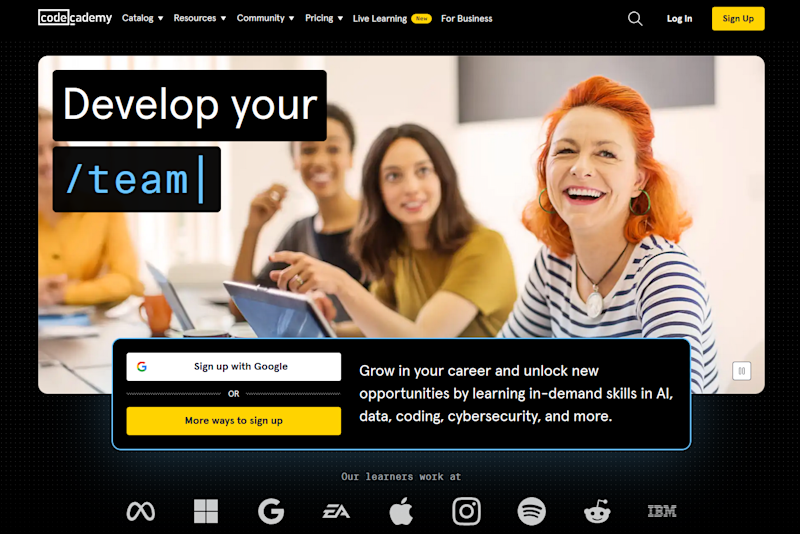
Codecademy offers both free and paid courses, all focused on specific areas of programming such as Front-End, Back-End, Machine Learning, and more.
As for pricing, they have a number of options:
They have student rates
Team rates designed for companies to skill up
Single use pricing that can vary depending on tiered access. This will also vary depending on if you pay monthly or pay for the year in advance
I’m going to guess that you’re probably the single use rate so let’s break that down:
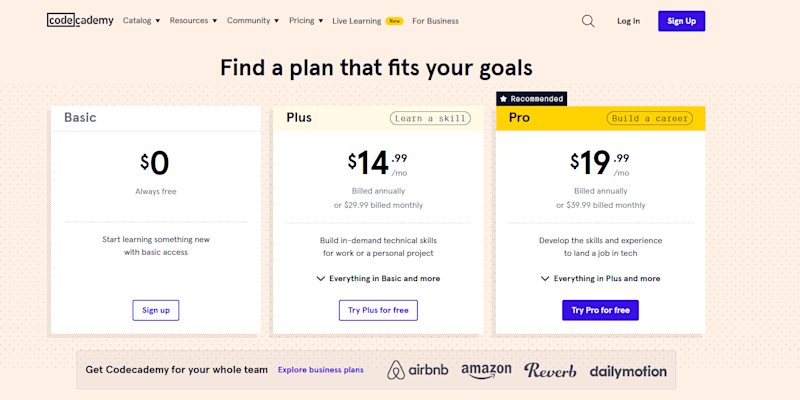
Here's how they work:
There are 3 tiers of access, with different courses and features available.
The free level is obviously $0 and gives access to some of their course catalog, some projects, and access to their community. However you don��’t get access to their information on how to get hired and lose out on some other features and more in depth support
The plus level is billed at $29.99 a month, or $14.99 a month if you pay for the year in advance. This gives you everything from the free tier, as well as access to the pay walled courses, and roadmaps of what to learn to get X role, certificates, and more responsive support. You still don’t get access to the content on how to get hired
The Pro level is $39.99 a month or $19.99 if you pay in advance. This then gives you access to all the career features. Honestly, most people learn these skills so they can get a job so I’m not sure why they lock these out. I’m guessing it’s so people can upgrade once they’re ready to start applying perhaps
With that out of the way, let’s weigh this all up.
Pros
✔️ Get started for free. Codecademy has some free courses to help you get started before committing to any payments. They're not as in-depth as the paid content, but you can start learning and get past that first barrier of learning something new
✔️ Don't go it alone. They also have community support to ask questions or share problems
✔️ Narrow focus. Unlike some of the broader platforms that can teach 1,000s of different topics, this platform is 100% programming focused content
✔️ Structure. They also offer skill paths and career paths to help you not just learn but also give you a more clear roadmap to actually getting hired. Again, this is in one of the paid tiers but I can't emphasize enough how much this content can help, from any platform
Cons
❌ Higher cost. So far we've been looking at either free or non specialist platforms. Because this is a programming focused platform, the price per month is on the higher end but still not crazy in our opinion, especially when you're skilling up for a potential $100,000+ a year career. In fact, it's a pretty good price point to get you to keep taking action
❌ Gated/Tiered content. Skill paths and projects are only available when you become a paid member. This is an issue as actively building projects not only helps you to learn easier and more effectively, but it also helps you stand out to prospective employers while getting hands-on experience. Ideally, you want courses that not only teach but also get you to build at the same time.
It's not just the projects that are gated either. Career paths and assistance/advice for getting hired is only at the top-tier price point, which is a bit 'meh'
❌ Wait, who is teaching me? Not much of an issue but there's a LOT of different instructors so it's possible you get to learn some topics from really great instructors and then the next course by a mediocre one.
My main concern however is that some course pages don't even have an instructor listed which would concern me, so do your research!
❌ No refund for you! There are multiple instances on TrustPilot of people having billing issues with Codecademy. Being charged for lifetime memberships immediately after starting a free trial, or billed across multiple accounts with no easy refund
TL;DR
Codecademy is a great platform. And from what we can tell, it seems to check all the key boxes you would want so it definitely seems worth considering.
That said, the most important factors are the quality of course content, the experience and skill of the instructor teaching you, and the support you'll have. So make sure you check out reviews of the course content itself and figure out who the actual instructor(s) will be of the courses you plan on taking before committing.
I'm also not 100% sold on paying the extra $10 / month for job application advice / training. If it's needed for the core reason why you join (i.e to learn and get hired), then it should all be included as part of the price, but that's my opinion.
That being said, when it comes to getting hired in tech, there's something you need to know. At the end of the day, whether you take an in-person coding bootcamp, learn for free on YouTube or use a paid resource, you're still going to have to put in the work to find and get a job.
We can only show you the best practices to make that happen.
This means you'll need to:
Build a portfolio
Find companies to apply to
Send applications
Practice for technical questions
Sit the interviews
Perform the monitored coding tests / projects
It's more work up front, but it's also why these companies will hire without the need for a degree.
And good news? We've put together this guide that has everything you need to know about the interview process for getting hired as a developer and passing coding interviews.
Here at ZTM we've had students follow our hiring advice and get careers at Tesla, Uber, Google, Amazon and others, and we're constantly keeping it up to date just like all our content. So you can be confident it is tried, tested, and true!
Udacity
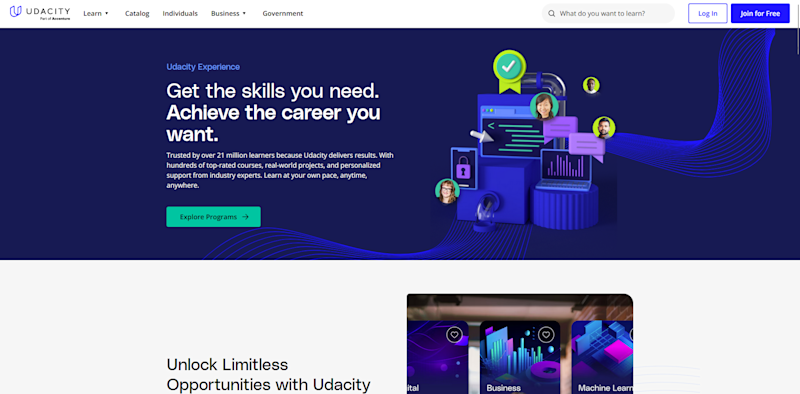
Udacity offers a staggering number of tech and programming courses, all taught by experienced developers who work at major tech companies.
Their training is focused on 3 audiences:
Individuals
Upskilling for teams
Government workers
As for the training itself, it comes in 3 distinct types:
Introductory lessons
Basic courses
And then something that they call ‘nano degrees' which are more in-depth courses and certifications
As for pricing, they offer a few options. You can either access:
Free courses
Access to their 'nano degrees' at $249 per month recurring
Or a 4-month subscription at $846 every 4 months saving 15%
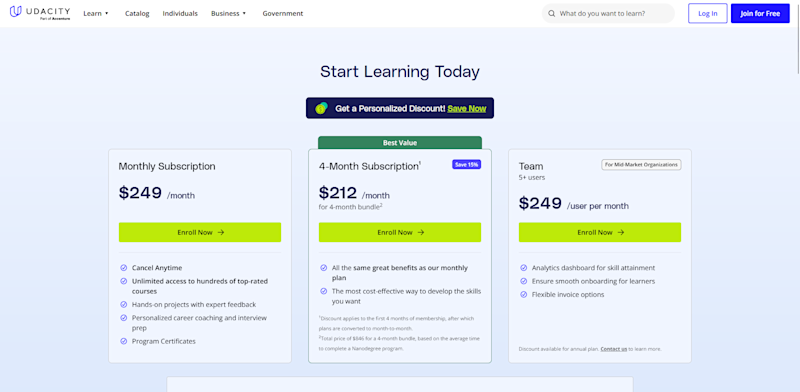
The average nano degree takes around 4-5 months to complete, so you're looking at around $1,249 to pass. So yeah, fairly expensive!
However, there are still some pros to this platform:
Pros
✔️ Authority. They have instructors from major tech companies
✔️ All the content! There's a HUGE library with literally hundreds of courses
✔️ Get help, fast! Apparently, the average community support time for a reply is under 1 hour. If that's true then that's fantastic
✔️ Niche focus. They also have dedicated training and certification for individuals and teams, so if you're the head of a department and want to skill up your team, you can drop that budget on a single location
Cons
❌ Expensive! Udacity is one of the most expensive options on this list.
In fact, some of the other platforms on here offer annual pricing for less than 1 month of Udacity. That being said, Udacity is still a lower cost than many bootcamps or University degrees, and you're potentially getting a pay raise or brand new career with this training.
❌ Weird certification process. It's a little strange but you have to apparently send a photo and government ID to get your certification:
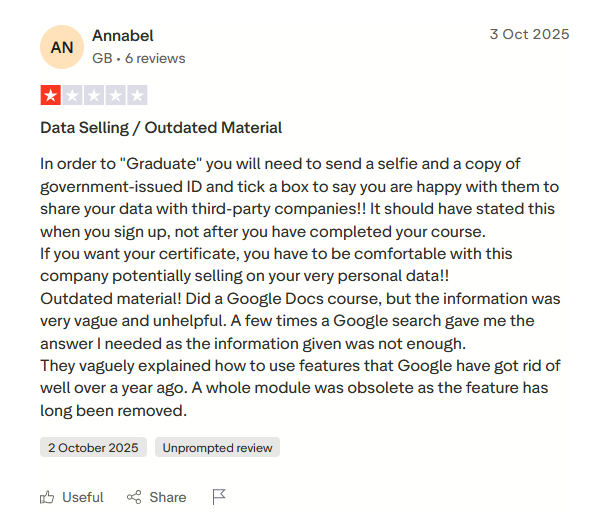
TL;DR
If you're quite comfortable financially and are someone that likes having more "skin in the game" (money in this case) to keep you accountable and actually follow through, this could be a good option.
Likewise, if you're a team lead and need a single source for training a team in a language or skill, then they do have a focus on this.
Zero To Mastery
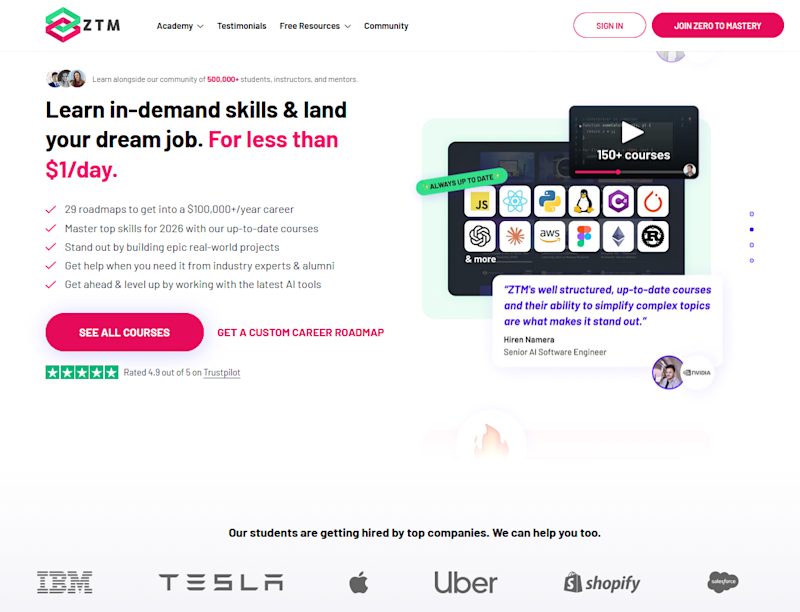
⭐ ZTM is my #1 recommendation for beginners, especially if you’re looking to learn to code and get hired ASAP.
Disclaimer: We are ZTM so of course we had to choose ourselves as #1 here. Wouldn't you?!
All joking aside, we genuinely believe it. But don't just take our word for it, go search YouTube, Google, Reddit for "ztm review" or something similar and see what others are saying.
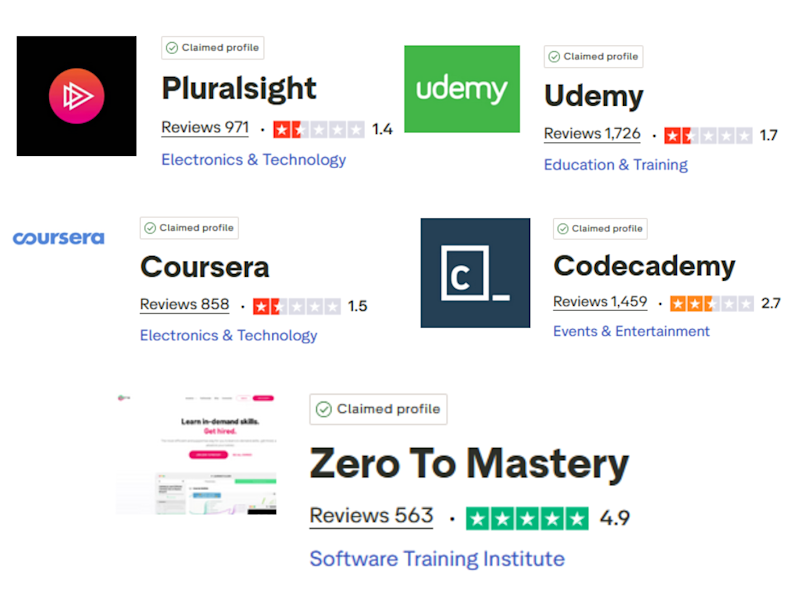
Also, you should definitely check out each of the options in this guide first before deciding. You need to figure out what's best for YOU. Everyone learns differently and has different needs.
With that disclaimer out of the way, let us walk you through why we think ZTM is the best option for people that are serious about learning to code and pursuing tech as a career.
Pros
✔️ Simple pricing. We have 3 pricing options:
The 3 options are:
Or a one-time purchase for $1,299 which gives you access to everything for life (because lifelong learning is a key to success)
It's worth pointing out that no matter which option you choose, you get unlimited access to all courses, workshops, career paths, updates, features on each pricing option. No gated content here!
✔️ Exclusive 30 Month lifetime challenge. The longer you train a skill, and the more frequently you do it, the better you become. It's true for athletes and programmers.
And because we want you to succeed, we put together a 30 month lifetime challenge that can save you money.
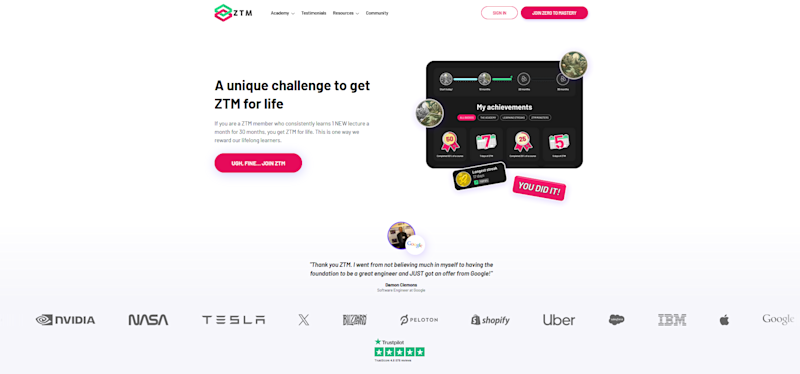
Here's how it works:
Stay a member for 30 months
And complete one lecture per month for those 30 months
Then we'll give you free lifetime access on month 31 forever
Not bad right?
That's access to all new and future courses too!
✔️ The biggest, most active and most supportive learning community online. Our private Discord server has over 500,000 members.
So in addition to learning alongside your peers, there are also mentors, teaching assistants, and instructors actively answering student questions every single day.
Our students say this is one of the biggest benefits of learning with us, because of how much it helps them get hired.
✔️ Project-based. Most of our courses involve you learning by building full scale, enterprise-level projects. (No joke, in one course you build a copy of Netflix!).
Because of this approach, we've had many students tell us that the projects they've built from our courses were what set their portfolios apart and impressed employers during their interviews
✔️ Student outcome-focused (getting you hired, getting you promoted, etc). Our training is specifically designed to take you from zero experience to getting a job.
Because of this focus, we cut any excess out of our courses.
This means we won’t teach you absolutely everything about a language because frankly, that's just unnecessary and a waste of your time. Instead, we teach you the essential foundations, how to be a problem solver that doesn't have to rely on tutorials (including us) and only exactly what is needed to get you building projects on your own as quickly as possible.
Why?
Because no matter where you learn to code, your actual skills and learning will 10x once you're struggling through the process of building your own projects and will 100x once you're actually working on a team with other developers at a company (and getting paid while you learn!!!).
Selfishly, the quicker we can help you get hired, the quicker you are going to tell your friends and family about us so that we can help them too 😉.
It's also why we created our tech career paths. These have step-by-step roadmaps of what to learn, resources to learn it, and how to go from zero to hired.
Become a Fullstack Web Developer
13 milestones 9 courses
Step-by-step roadmap where you'll learn to code and build a portfolio.
Curated curriculum of courses, workshops, challenges, projects, and action items.
Become a Fullstack Web Developer from scratch and actually get hired.
Earn on average per year:
$115,887
US salary data collected from Indeed, LinkedIn, and Web3.career 2026.
This focus on getting you ready for what you'll actually be doing each day is also why we don't believe in having built-in IDE's where you code along within the window itself. Sure, these features can be super helpful for when you're starting out but eventually it becomes a crutch, and it's not how the real world works (or coding interviews or take home projects).
Our focus is making sure you're prepared for the real-world and on being able to get hired, so we get you using the actual tools you'll be using in the real-world right away even though it's a bit tougher at first. It's a slightly steeper learning curve, but it means you have a strong foundation from day one.
✔️ Course catalog is focused only on in-demand skills. This is a con for some people and that's fine but we don't teach every single topic or every language out there on purpose.
We'd probably make more money if we did, but that's overwhelming for students who are looking to kickstart or change to a career in tech as efficiently as possible. Instead, we only teach the most in-demand skills (i.e training for languages that companies are actively hiring for, have a future, and will get you paid well).
✔️ We even teach soft skills (super underrated). This is something we haven't seen many places teach, let alone make a priority. Not many people talk about this but technical skills alone just aren't enough. Tech skills will get you the interview but it's your soft skills that will get you the job, your promotion, and make sure you can work well in a team.
Communication, problem-solving, team work, etc. These are the skills you need to set yourself apart from other candidates. They are definitely in-demand and working on these skills will serve you well for your entire career and life.
✔️ Quality > Quantity. We purposefully don't have the highest # of courses because you don't need 1,000 courses to learn Python and be able to get hired as a Python developer. It's also impossible to keep that many courses up-to-date and to continually improve them.
Instead, we add courses slowly and only when we feel they are as good or better than any other course out there on that topic. In fact, some courses don't even get published if they don't meet this criteria.
This also allows us to spend time on improving and updating older courses as our instructors and team continue to get better and more knowledgeable and as we get feedback from our students.
✔️ Instructors with real-world experience. Rather than have 100s of instructors where some are great, some are ok, and some are terrible, we only have 1-2 instructors per field and ensure they have real-world experience. Each of them is then also responsible for supporting and maintaining their channels in our Discord.
✔️ Most up-to-date content. This is one of the most important factors you should look at when evaluating courses and platforms out there, and we are completely obsessed about this point.
Our agreement with instructors is that their courses have to be constantly updated and improved. There is no "set it and forget it" like on many of the big MOOC platforms out there (not naming names).
It's honestly a lot of work and a huge time commitment which is why many other places can easily get 6-12+ months behind on updates. But we've made a promise to our 1,000s of students and they've come to know and trust us on this point so we can't let them down. (It's often a major benefit that our students comment on in Discord.)
✔️ We try to make learning FUN! 😱 Blasphemy right?! Let's face it, learning anything new is hard but it's a lot better if you're learning alongside other good humans and having a bit of fun along the way.
If you don't like having fun, ZTM is not for you. Seriously... you won't be able to handle our corny jokes.
Don't believe us?! Better check out our super serious Instagram account and dreadfully boring TikTok.
✔️ Peace of mind. We also have a no questions asked, 30-day money back guarantee so come try us out and if it's not a good fit, no problem, just email support within 30 days and you get your money back.
Cons
❌ We don’t offer a free plan. This is because we want you to take action! That being said, remember that you can watch the first few hours every one of our courses on our YouTube channel. They're just not as up to date as the paid versions of each course.
❌ More expensive than some other options. We believe it's very justified though, as our reviews and testimonials can attest to.
❌ Don’t have a huge collection of courses (discussed above). If you're looking to learn very niche or older languages and frameworks, you're unlikely to find them here.
❌ We're the 'new kids'. Well kind of. We haven't been around as long as some of the other platforms so we don't yet have the same brand name recognition, but we do have similar levels of expertise.
As for who you learn from? Well, to be honest it really doesn't matter when applying to coding jobs anyways... if you can show that you have the skills and would make a good team member, no one cares where you learned or if you even have a degree.
Like we said earlier, we've had students hired at Google, Amazon, Tesla and other FAANG companies, and some of which had never written a line of code before in their lives!
And as for being the new kids? Well it just means that we're not stuck in rigid or outdated methods of teaching. We're agile and focused on teaching you in the best way, so that you learn, stand out and get hired.
TL;DR
If you want to get a job in tech ASAP, then we believe we have everything in place to help you get there as quickly as possible.
Give us a try and if we're not the best fit for you, just email support in 30 days. What do you have to lose?
OK, so enough about us. Let's look at some more options that might be a better fit for your needs.
Code With Mosh
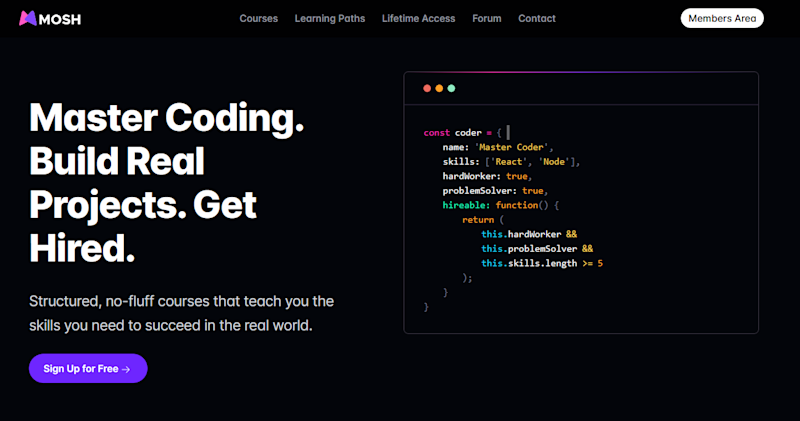
Code with Mosh has been around for a while now. He’s a super nice guy, has a lot of real-world industry experience and is a top notch instructor, especially for beginners.
He also has a popular YouTube channel. (When I say popular, we're talking _millions_ of subscribers) with tons of free lessons so you can go check him out and see if you like his teaching style.
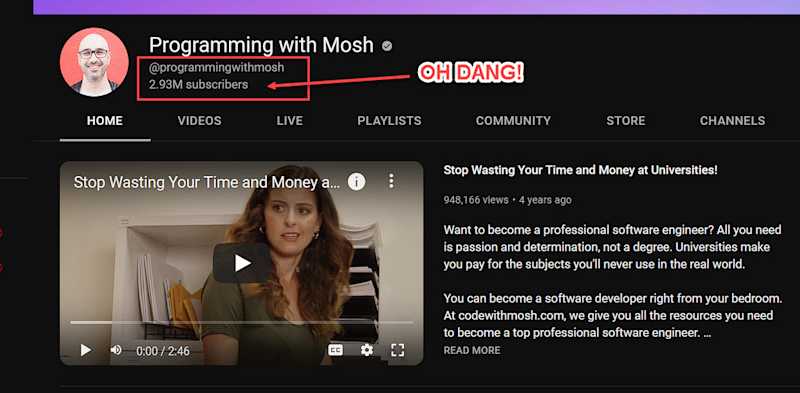
He has courses on many of the most in-demand languages and frameworks, as well as learning paths for specific roles such as front-end, back-end, mobile or game development.
As for pricing, he offers 2 options:
You can either pay a one-off price for courses ,which can be anywhere from $50 to $400 dollars each
Or, you can purchase lifetime access to all his courses and future ones for $678 (although he does sometimes have deals on this)
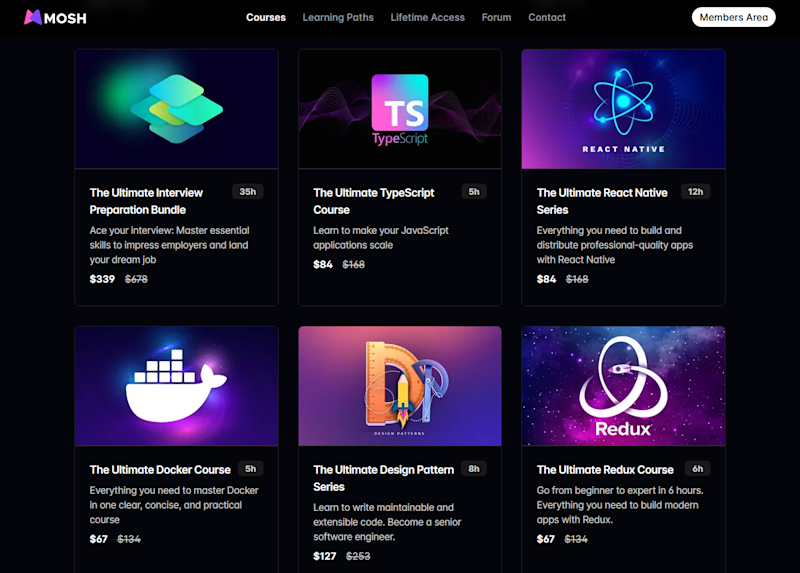
Pros
✔️ Crazy cheap! $50 one off is not bad at all, Is it enough to get you to take action? Test it out and see.
✔️ You don't have to go alone. Mosh has a supportive community that helps each other out.
✔️ Learning for all levels. Mosh offers multiple courses, broken down into set levels of comprehension.
✔️ Train for specific roles. He also has skill paths for careers. You take a series of different courses back to back, to gain the groups of skills required for that job.
He also offers training on Game Development which isn’t something many course platforms cover!
✔️ One experienced instructor teaching you. Now this is either a pro or a con. If you like the way Mosh teaches and it resonates with you then you'll likely enjoy all his courses (vs. other platforms where your instructor could be changing every other topic). At the same time though, if it doesn't resonate, well he's the only person teaching.
✔️ Get a refund if not happy. Mosh offers a 30-day money back guarantee.
Cons
❌ No entry level pricing option (Although you do own the course so no ongoing fees)
❌ Less support than some other options. Due to the high demand (and low course cost), Mosh isn’t able to provide direct support. Instead, he fosters a community to help each other
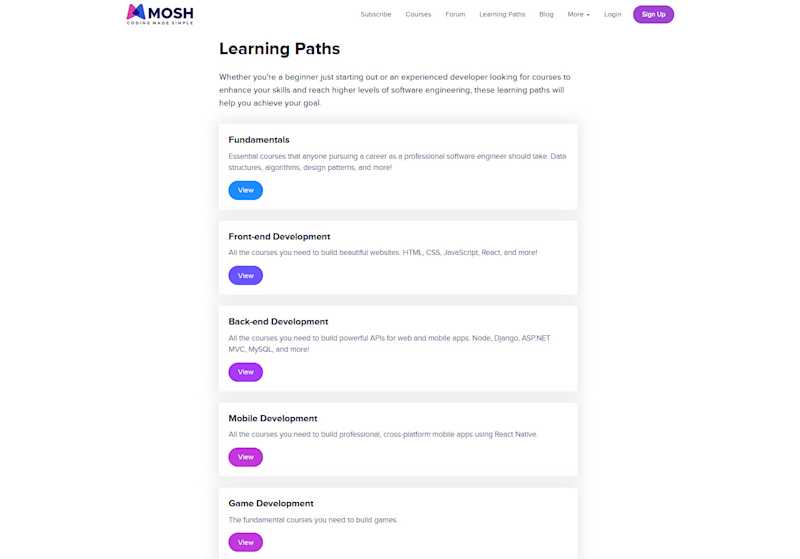
TL;DR
Programming with Mosh is a great option. He has some brilliant courses at a great price, especially for beginners. Definitely check him out!
Coursera
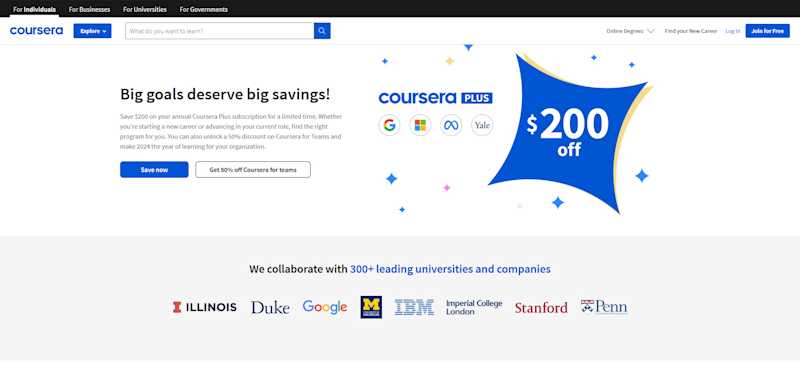
Coursera is a unique option here, in that it’s directly affiliated with prestigious universities who then create the course content and offer online Bachelor's and Master's degrees.
It does mean that there’s a high volume of training available on the platform, but it's spread across various different industries and not just tech.

As for pricing, they offer a whole heap of price points for different options.
It can be a little confusing but bare with me:
They offer some free courses in different fields, but they do not have projects or certifications in those free courses
Then they have guided projects starting at $9.99. These are smaller courses with activities and basic projects to complete. Nothing huge but they help you retain what you're learning
Next on the list are ‘specializations, and these start at $59 a month or $399 a year. This is where you will find courses such as Data Science with Python etc
Professional certificates start at $39 a month and last for around 6 month
Then you have MasterTrack certificates which start at around $2,000. These last for around 4-7 months but are accredited towards a University degree
Finally you have the actual online degrees themselves. These take anywhere between 2-7 years to complete, and the price ranges from $15,000 to $40,000.
They also offer team and Enterprise plans, starting at $399 per user, per year
Like I said, it's super confusing and that's a lot of options so let me give you some advice.
To actually learn to code and get hired, you'll probably have to go with one of their more expensive options, simply due to the depth, the projects and the support.
These more expensive options do come with certificates and degrees but like we said earlier, most tech companies don't care that much about "certificates". They just care that you can prove you have the skills to do the job.
No joke. They will care more about your application letter and your portfolio, then they will care about where you learned or what certifications you have.
So let’s weigh up some of the pros and cons.
Pros
✔️ Get a degree!. You can become university qualified, without having to attend the university and for a much smaller cost. Not only that, but the courses are created by the same people who create the university degrees (this can be good or bad).
✔️ Large library. They have a wide range of topics to learn from. They also just purchased Udemy so we will see if they add that here or keep the platforms separate.
✔️ Some cheap options. They offer entry level price points to get started to see if you like the teaching. That being said, the courses do dramatically change between tiers. Some will teach you a skill, others a part of a syllabus.
Cons
❌ Where to start?. It can be confusing to use with so many pricing options, courses and various subjects.
❌ OMG, the cost and time frame! Yes you can get a degree, and sure it's cheaper than going in person but its still so expensive and slow! Why spend $40k on a 3 year course, when you can get the exact same job in 6-12 months, at $49 a month elsewhere?
Remember, unlike other career options, tech employers really don't care about where you studied, just as long as you know the right stuff and can do the job. Heck, a lot of the Senior Developers in Silicon Valley are self taught and don't have a degree.
And 3 years? That's so long in the tech industry! What if what you're learning isn't even relevant by the time you finish?
❌ Be prepared to 'Nerd Hard'. University courses and instructors are notorious for focusing way more on theory than actual real-world in-demand skills which can be pretty boring for most people.
TL;DR
Coursera are basically a "University-lite" option.
They're not among our top picks but that doesn't mean they couldn't be a good choice for you. If you always wanted that degree, have responsibilities and need to learn remotely, AND have the time and finances, then this platform can help you meet that goal.
Educative
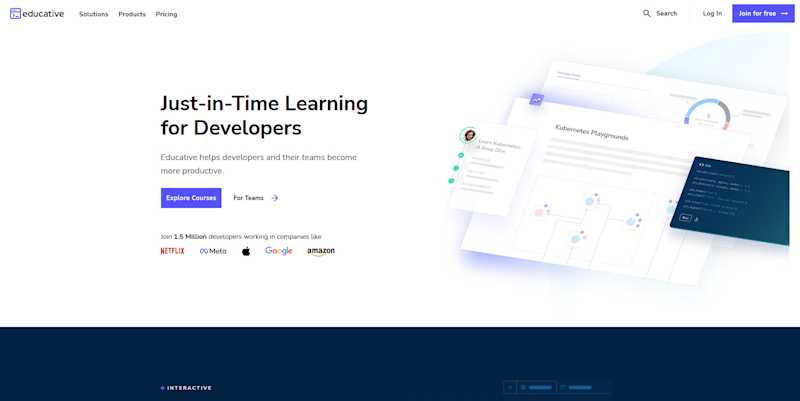
Educative is another great option, with entirely tech focused courses, and a built in code editor (IDE) inside the browser to help you code along with the course.
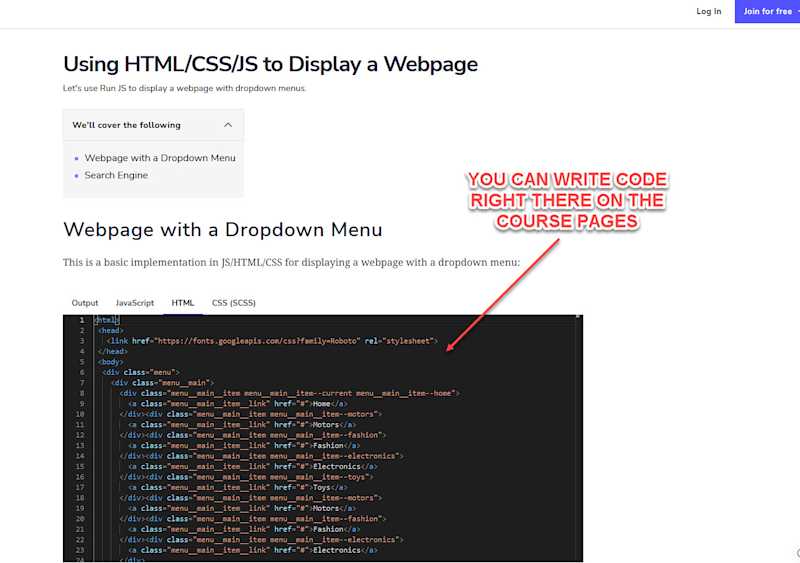
In reality, you can just as easily open an IDE like Sublime or VS Code that you would use in the real world and use that instead. But we do admit, it is a cool feature for beginners because you get that instant feedback right there inside the course platform.
However, over the long-term, these built in coding tools can become a crutch where you struggle to code in the real-world, simply because you haven't had to learn the tools that you'll encounter when building your own projects, working at a company, or even when you sit the interview.
Imagine getting an interview and then not knowing how to open, use or write code in the standard industry tools because you always used the built in tool inside the course?... That would suck!
Anyways, let's look at some other aspects.
One thing that stands out is their course library, which is quite frankly ridiculous in its size, with over 500 combined courses and projects!
Some are bootcamp style beginner to mastery courses, whereas others are ~2hr courses covering a specific feature or problem.
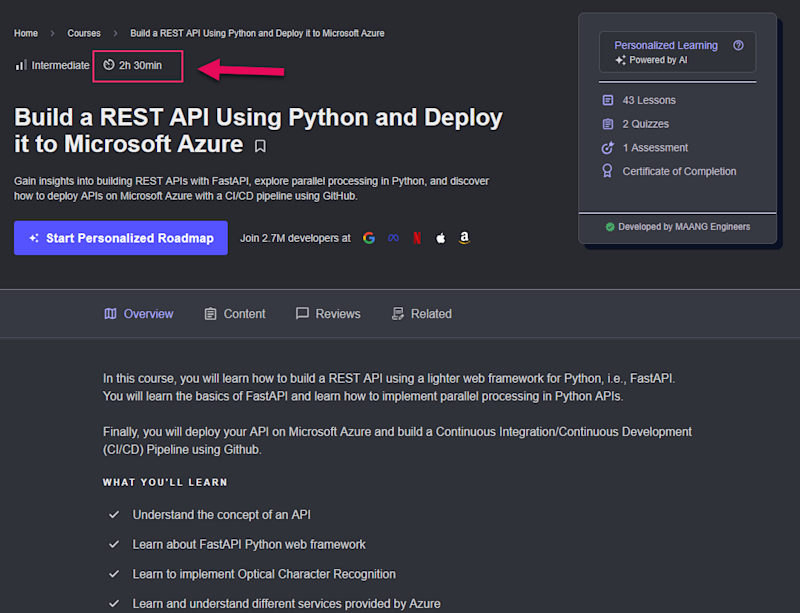
As for pricing, membership starts at $59 a month, going down to $16.66 on a monthly ‘standard’ membership, when you pay annually, or $24.99 a month for the premium option, again, when paid annually in advance.
The standard option gives you access to courses and certifications, while the premium model offers the same, but also includes projects and career/skill paths.
Pros
✔️ Huge volume of content. Some of which are super niche which can be very helpful when you need to learn a specific task.
✔️ New courses are released regularly. These can vary from in depth content to shorter 'how to do x' type lessons that fit a specific language or framework.
✔️ Immediate feedback. Thanks to their built-in code editor, you can get direct feedback as you work through the course, as well as some basic questions and answers after each lesson to help test your knowledge and retention.
Cons
❌ No videos! Courses are text based instead of videos. Some people prefer this, and even find it easier to learn from, but not everyone finds reading as a faster method to learn.
❌ Not much support. With no community and only email support, you're learning alone.
❌ Gated content. Price gating projects and skill paths isn’t great, because as we’ve said before, you need these projects and pathways to learn the right things, at the right time, and in a way that helps you retain and understand that information. This means that realistically you're stuck paying the highest price, which isn't too high but still steeper than ZTM or Codecademy. (Unless you pay for the year in advance).
❌ Is it up to date? With such a large catalog of courses, it can be hard to keep them all up-to-date. And you don't want to waste your time with outdated content so double check you're learning the right stuff.
Also, with so many different instructors creating content, it's harder to maintain quality across all the courses... we obviously haven't tried all of them but we did notice some are better than others
TL;DR
Educative is a good option if you prefer text-based vs. video-based lectures or have a super wide variety of topics that you want to explore and learn.
Frontend Masters
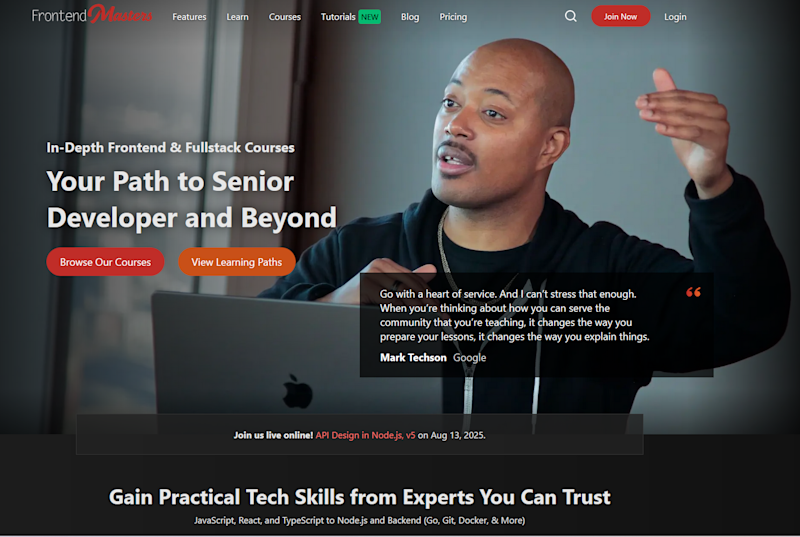
⭐ My top pick for developers who either already have careers and have specific topics they want to upskill, or are looking to specialize.
Frontend Masters are one of the longest running coding platforms, starting around 2008. They consistently put out top quality content and training from some of the most well-known instructors and names in the industry.
This is because their main focus, as you might have guessed, is on front-end development, but they do offer some full-stack and back-end training courses to supplement this.
They have over 200+ courses with nice and simple pricing at either $39 a month or $390 a year.
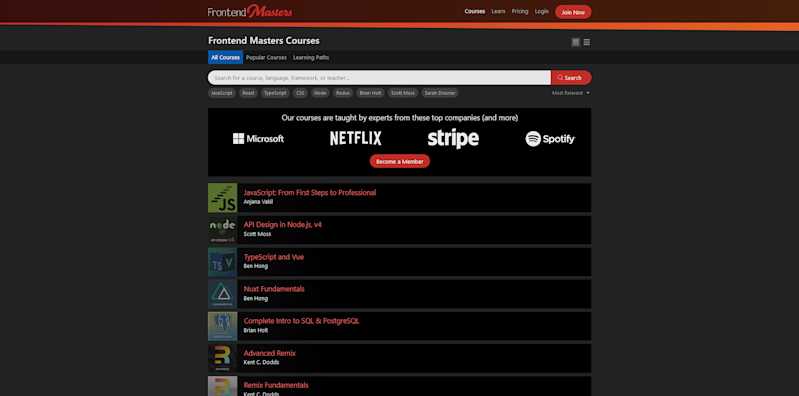
Many of our own developers and instructors here at ZTM have used the platform at some point in their careers so we can say with personal experience that it's a great place for upskilling.
In fact, we even asked our own team what site(s) they ever use other than ZTM and the most common one was Frontend Masters.
Why is this the case? Well let's ask them...
Here's what one of our own in-house developers, Matt, had to say:
The biggest pro of FEM for me is that most of the courses are very short and concise.
I could complete a course on X in less than 3 hours. This was great because sometimes I just wanted to learn the very specific thing I'm looking to learn, as opposed to having to skim through a full 30+ hour crash course.
The one downside is that since the courses are generally more live stream style, they don't feel as fast paced, focused, or engaging as perhaps ZTM's lecture system (2-15 minutes each).
You can tell that ZTM puts a lot of time into clearly defining the lectures and the order of them before recording, whereas FEM just made cuts from the raw recording and created a lecture from it.
And here is what another one of our developers Cindy had to say:
I second what Matt said. That's how I feel about FEM as well.
My membership has expired ~1 year ago so not sure if there is any new features but here are my pros and cons:
Pro #1: Learn from the best (big names like Kyle Simpson, Kent Dodds, Brian Holt, Sarah Drasner, Jem Young)
Pro #2: Shorter courses = greater sense of accomplishment
Pro #3: Courses are organized into learning paths (e.g. full stack dev) & topic paths (e.g. learn HTML, learn CSS, learn React, etc)
Con #1: Not very engaging. I chose a backend course and then I fell asleep. The next thing I remembered is that I'm 20% into the course (due to auto play video)... oops 😅. The live stream recordings feel less organized & slow-paced
Con #2: Their annual membership isn't much of a deal
Con #3: One of my fav instructors on the platform (Sarah Drasner), no longer publishes new courses on FEM. In fact, her courses are in the course archive now 😢
So with that amazing insight directly from two full-time developers, let's sum up the pros and cons:
Pros
✔️ Top tier content. High quality content and top notch production value (especially for upskilling and more advanced topics).
✔️ Authority. Learn from some of the "big name" instructors that have experience at some of the big tech companies (Kyle Simpson, Kent Dodds, Brian Holt, Sarah Drasner, Jem Young).
✔️ Clear, simple pricing. No confusing tier system or gated access either!
✔️ Front-end focused. If that’s your goal, you’re going to find almost everything you need in one location.
✔️ Nerd out on the go! They have their own iOS and Android app platforms if you like learning on mobile.
✔️ Designed to help you finish. Shorter courses help provide a quicker sense of accomplishment, and also teach what you need for specific smaller tasks.
Cons
❌ Front end focused. Again, great if that's your goal but not if you're looking to learn other aspects. Sure, they do teach some full-stack and back-end courses that directly fit into front-end focused, but there may be better options for you if you want a range of training outside of that.
❌ On the fly isn't always the best. Because some courses are filmed off the cuff in an AMA type chat, the content can be a little slow paced and not the most engaging.
❌ Which is best? They offer multiple courses on the same topic which can get confusing as to which one to take.
❌ Needs more structure. Although the content is fantastic, it's not as beginner friendly as some other options on this list.
Why? Because you need to piece together many different courses (their career and skill paths do help with this but it's not as "bootcamp" as other options on this list).
TL;DR
If you have a bit of programming experience and want to upskill, then this is the place to go. Just make sure you've had your coffee first or you might fall asleep like Cindy did 😂.
Egghead
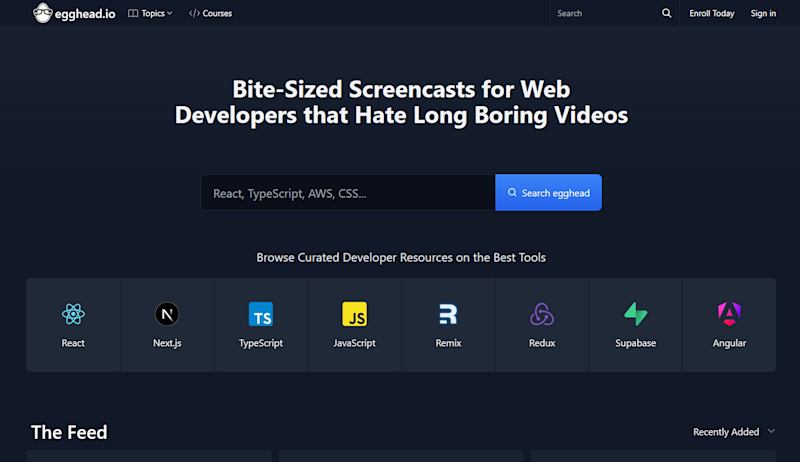
With a focus on full-stack programming training for Web Developers, and over 400+ courses, Egghead is a great training platform.
Their pricing model is nice and simple at either $25 a month, $70 for 3 months, or $150 for the year (if paid in advance). Each price point gives access to all the same features.
Pros
✔️ Some free content. They offer a small selection of free courses.
✔️ Cheap! At just $25 a month, this is possibly the lowest price for a recurring membership, without paying for an annual discount.
✔️ Learn all the things! With 400+ courses, they offer a wide range of full-stack courses across multiple languages and frameworks.
✔️ Expert advice. We can't speak to all of their instructors but some of them are definitely top notch and well regarded in the industry (ex: Kent C. Dodds).
✔️ Training assessments. A fairly unique feature, you can sit online tests for a max of 3x to assess how much you know on a topic so far. This is good for gauging your progress and what you need to double down on.
Cons
❌ No community. Although you can leave comments on each course video and ask questions.
❌ No career advice or skill paths. This means it can be hard to know what to learn and when, as well as no advice or help for getting hired, once you've skilled up.
TL;DR
Egghead is similar to Frontend Masters in that they're most useful for people that have some previous programming experience but have very specific topics or skills they want to learn and brush up on.
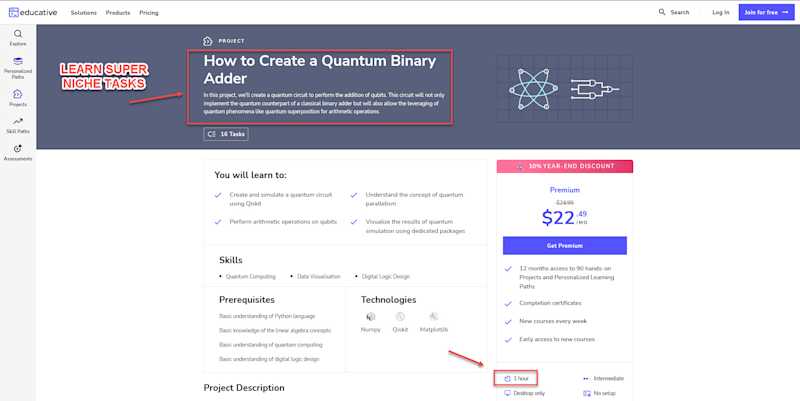
You can almost think of it as a 'Google-Fu' resource. If you can't find the answer of how to code something specific elsewhere, there's a good chance they may have a walk-through here.
Pluralsight
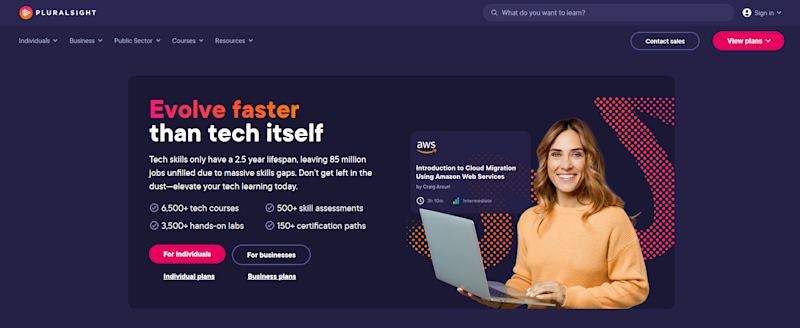
Pluralsight is unique in that it not only teaches programming to individuals, it also offers consulting advice and training for team leads.
For now though, let's just look at the main features and options for individuals. This is another online education juggernaut with over 7,000+ courses, focusing on larger topics and then niche areas that you might want to learn for a language or solution.
As for the pricing, it’s a little complicated. Basically you have 3 tiers (with further discounts if you pay for a year in advance):
Core tech is $30 a month and gives you access to 3,900 courses (of the 6,500 total)
Then you have specializations at $35 a month (which also includes the core tech training). So if you want to learn AI, data, cyber security or Cloud then you need to be on this price point. That being said, I’m fairly certain you only have access to the one you choose + the core lessons
Finally, you have the ‘complete’ tier, which is access to every course at $55 a month
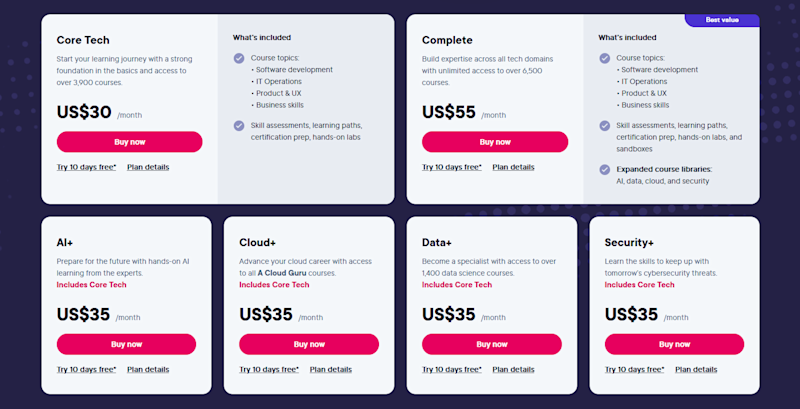
Honestly, it would probably be easier for them to just offer the $55 a month as the single price point and then an annual discount.
Pros
✔️ Not too expensive. Even for the premium membership, it's still only $55 a month.
✔️ High quality content, teachers and expertise. Not to mention the option to also learn super niche tasks.
✔️ They cover technical interviews!. A big part of getting hired is learning how to solve technical problems live on the day, while being monitored by the interviewer. As you can probably guess, it's worth learning all this in advance and practicing!
They are not the only platform to offer this type of training (ZTM, Codecademy, etc include it), but the majority of them do seem to miss it.
Cons
❌ Gated access. I'm not a fan of gating content under different membership tiers, again, especially if it's something vital for your success, which means you pretty much need premium.
❌ Overwhelm. A HUGE volume of courses can be overwhelming. For instance, although they cover tech interviews and how to get hired, which is fantastic news, they also have 6 different courses on the topic!
If you think that’s a lot of options, then their Python training is over 30+ courses (not lessons, but complete courses... how do you choose?!)
❌ No dedicated community. They do have a questions section via Disqus on each course, so you can leave a message and then check in and be notified when there's a reply. It's kind of good in that there's a thread, but also bad in that it's not as likely to be answered as quickly.
TL;DR
It's a solid platform but you can get just as good quality (and more support) from other options on this list for a better price.
DataCamp
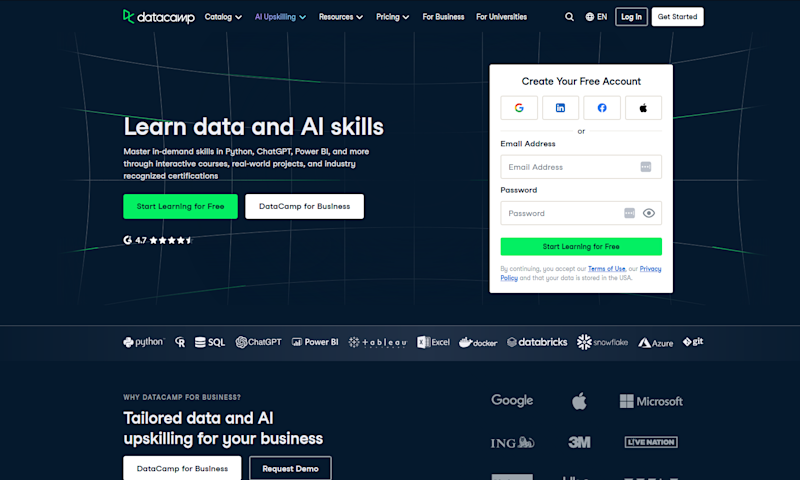
We didn't include many "specialized" platforms on this list but wanted to include DataCamp because it's by far the most in-depth if you’re looking to focus on Data Science, which is a very high demand job area.
It's not what most people have in mind when they think of "learning to code" but because so many companies rely on people with skills in Python, SQL, R, and more, that's where DataCamp focuses its training.
In fact, it's probably not the place you would go when first starting out learning to code, UNLESS you wanted to become a Data Analyst. In reality, their training is probably more focused on upskilling current coders into more data analytics roles.
As for the platform itself, DataCamp is very focused on the business market (getting companies to pay for access for their employees). In fact, they claim that 80% of Fortune 1,000 companies use them to help train their teams.
Pricing is a little different here, so let’s break it down:
They have 500+ courses
The first chapter of ANY course is free to watch, so you can check the course out before purchasing
A subscription is $35 a month, but if you’re on a team, you can get it down to $28 a month, per person
Finally, they also offer Enterprise pricing but you need to contact them as it varies
Pros
✔️ Large library. They offer a huge selection of courses.
✔️ Try first. We really like that you can try any course's first lesson before committing, so that you can see for yourself if you like the teaching style and quality.
✔️ Not too expensive. Pricing is middle of the pack.
✔️ Job board They have their own job board and provide help and advice for getting hired in DS roles. This is available without even being a member which is awesome. (You still need to follow the same process for applying as any other coding job. It's just that here, they have a list of specific, currently hiring roles).
✔️ Projects at every level! They have 'code along' projects which are great for retention, and some are even included with their free content!
✔️ Instant feedback. They also offer skill assessments to help you know where you’re at.
Cons
❌ Narrow focus*. The entire platform and 350+ courses are focused entirely on Data Science so if you're reading this post and wanting to learn HTML / CSS / JavaScript / React, etc. etc... this won't be the place for you.
Also, with so many courses, it can be pretty overwhelming vs. just having one bootcamp that takes you from zero to being able to get hired.
TL;DR
DataCamp is a fantastic platform but focused on one area of expertise - Data Science. That being said, there is a growing demand for people with these skills, so if you’re just starting out and are interested in this field, then it's worth looking into.
So what are you waiting for? Choose a platform and learn to code today!
Hopefully this guide has helped you break down some of the confusion among the hundreds of training platforms out there.
If you're still not sure, To help make it simple also, here’s the platforms that I recommend, for specific criteria:
⭐Do you want free? FreeCodeCamp will steer you right
⭐Do you want something cheap so the cost helps motivate you? You can grab some bargains on Udemy... but please make sure to do your research (Code With Mosh is a close second... but he also has courses on Udemy)
⭐Do you want structure, support, and a clear path to getting hired? We think that we (Zero To Mastery) do a pretty damn good job at this. You can go from complete beginner to being paid as a coder in under 5 months
⭐Do you want a specialized skill set? If you already know how to code, check out Frontend Masters or if you want to go deep into data science, check out DataCamp
⭐Do you want a college degree? Coursera is probably your only option, while also being much cheaper than attending in person
💡 Bonus tip: If you're trying to decide between 1-2 options and are on the fence, simply Google reviews of each platform, or check out their TrustPilot:

This is a 3rd party platform so the reviews on there are legit.
Honestly though, whatever option you choose, choose today so that you can get started towards getting an incredible new skill with amazing job opportunities. You’ll be amazed at how fast your life can change.
The best time to start was yesterday. The second best time is today.
Best articles. Best resources. Only for ZTM subscribers.
If you enjoyed this post and want to get more like it in the future, subscribe below. By joining the ZTM community of over 100,000 developers you’ll receive Web Developer Monthly (the fastest growing monthly newsletter for developers) and other exclusive ZTM posts, opportunities and offers.
No spam ever, unsubscribe anytime





